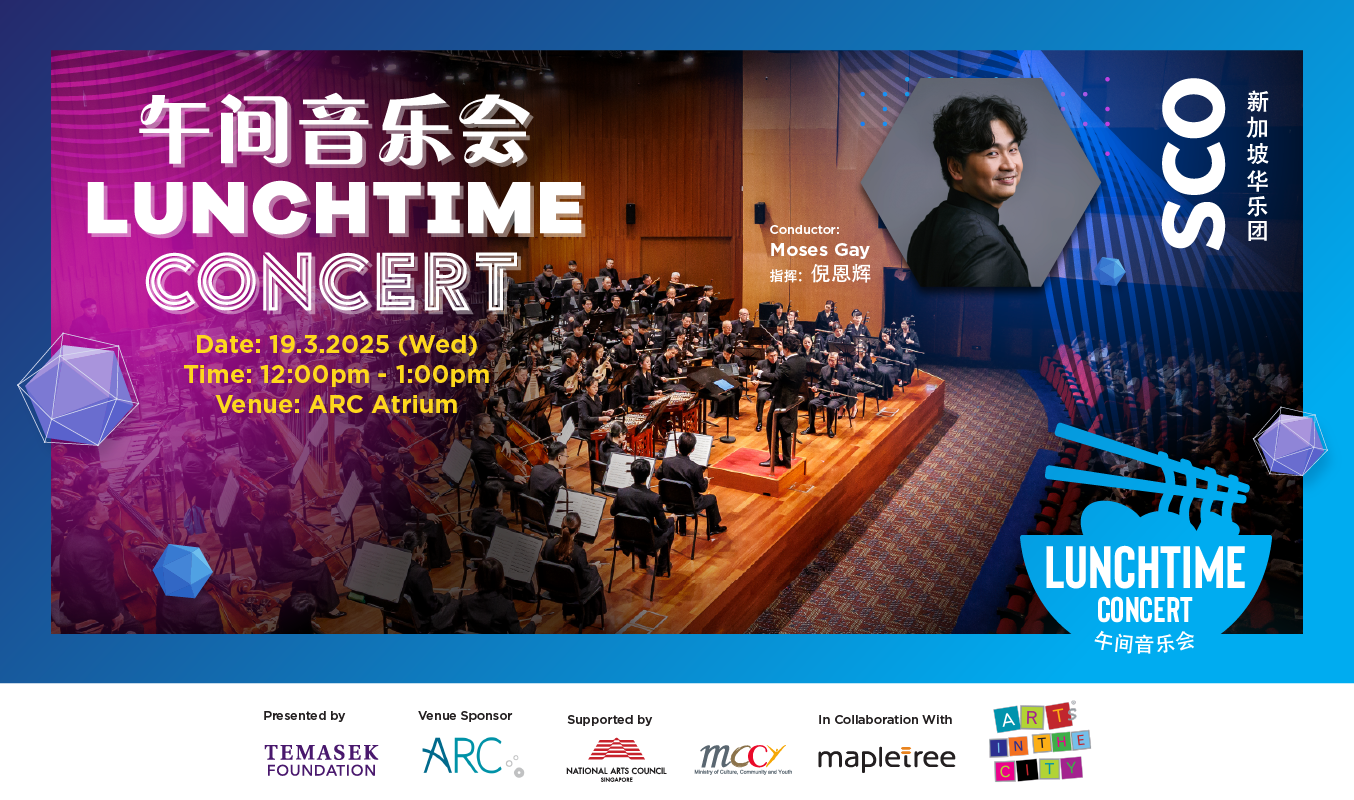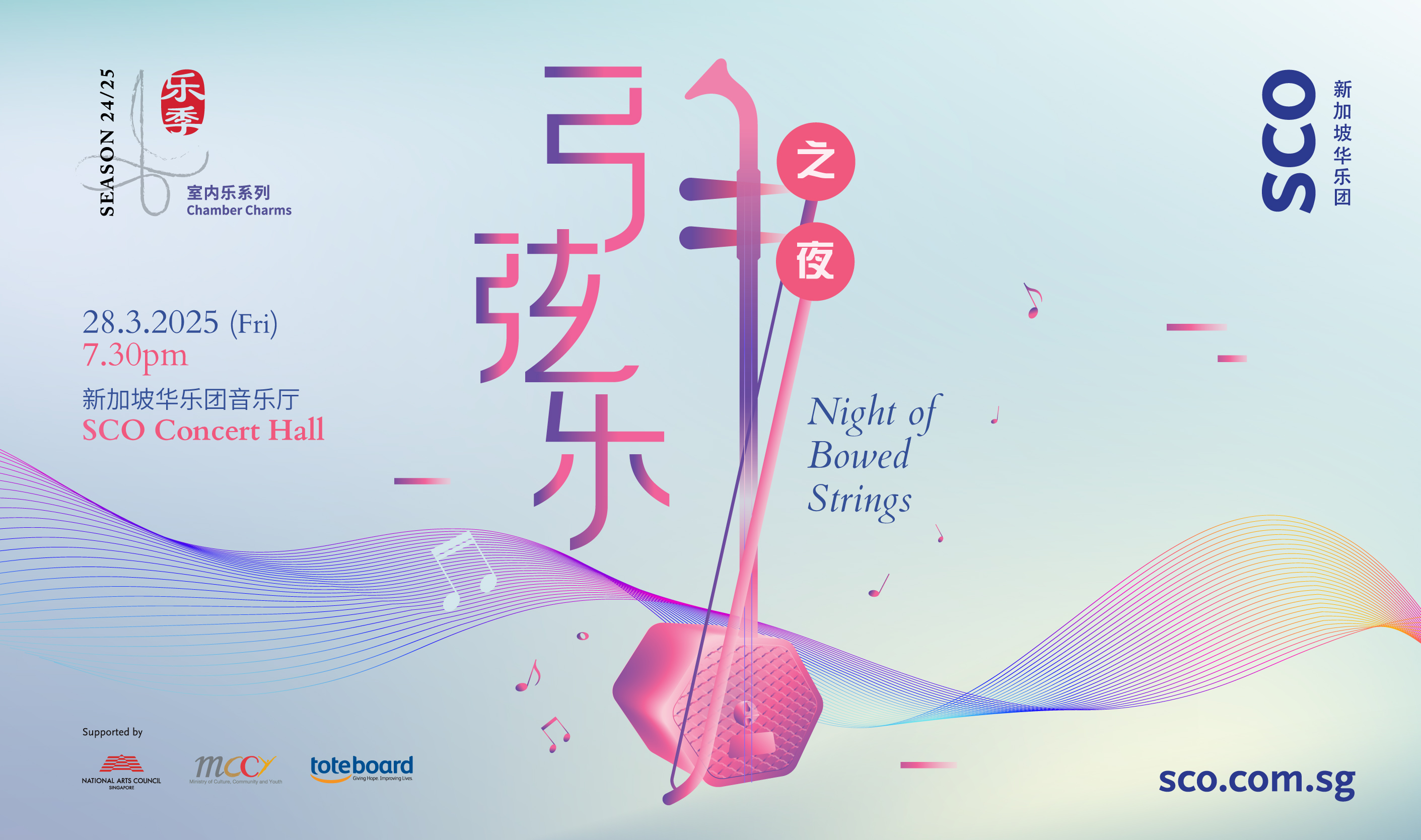Concert Season 24/25 Opening Gala 乐季 24/25 开幕音乐会
By Zhang Heyang
Since the founding of Singapore, the city has been an important trading hub, where diverse cultures converge and blend. Curated by Principal Conductor Quek Ling Kiong, "Seamless" is not only the theme of tonight's concert but also the motif thrust for the 2024/25 concert season of Singapore Chinese Orchestra (SCO).
The highlight of tonight is undoubtedly the symphonic poem The Sisters’ Islands, which is thoughtfully incorporated with Malay dance. Inspired by a local folklore, this music tells the story of two young Malay sisters who encountered pirates and drowned, thereafter turned into islands. Resident composer of SCO, Wang Chenwei won the Singapore International Competition for Chinese Orchestral Composition in 2006 at the age of 17 with this piece. The music opens with a style of Indonesian gamelan, depicting the scenery of a fishing village, while the sisters dance gracefully to the rhythms of "asli" and "zapin" Malay dances. In the conflict segment of the pirate invasion, the musical narrative would be visually enhanced by the dancers from the Era Dance Theatre, choreographed by Cultural Medallion recipient Osman bin Abdul Hamid.
Osman was conferred the Cultural Medallion in 2023 for his contribution to Malay dance, part of which includes infusing elements of Malay martial arts. As Quek shares his artistic concept: the essence of “Seamless” lies in the crossing of disciplines and exchange of cultures, not to overplay one another on the surface but to create synergy through apt points of convergence. His philosophy will also be reflected in the presentation of Girl from Kroran, a yangqin concerto to be premiered in Singapore tonight.
Kroran was an ancient kingdom along the Silk Road that mysteriously disappeared in the 4th century AD. It became famous again in 1980 when a well-preserved female mummy, estimated to have lived in the 20th century BC, was discovered. Composer Chung Yiu-Kwong drew inspiration from this story and the music of the santur, a counterpart of yangqin in Persia, to compose the music that is flavourful of characteristic modes from Asia Minor. An unusual concerto, Girl from Kroran opens with a substantial passage in cadenza and will be beautifully complemented by a solo Malay dance.
Impressions of Chinese Music: Daqu - the theme piece for the musical drama “Impressions of Chinese Music” was composed by Jiang Ying when she was the resident composer of Chinese National Traditional Orchestra. It begins with a guanzi solo and evokes a sense of antiquity and remoteness. As the music progresses, it showcases the unique tonal quality of Chinese orchestral music. The composition is delicately emotional, expressive in the sentiment of "impressions" and leaves the audience with an enormous room for imagination.
“Meeting a kindred spirit through music” has always been an ideal for the ancient Chinese literati, this is beautifully embodied in the guqin piece Flowing Water. Orchestrated by Peng Xiuwen, a late doyen and pioneer for Chinese orchestral music, this work has various parts of the orchestra playing to mimic the distinctive sound techniques of guqin such as sliding and harmonics, hence embodys the idea of seamless fusion.
As aptly named it is, Symphony of Sizhu is a marriage of Jiangnan Sizhu and Western Symphony. The composition employs an adagio - vivace symphonic form of two contrasting movements, and develops from a folk tune of Jiangsu province. The music emits charms of a water town in Southern China, before it later builds into symphonic grandeur, expressing the composer’s admiration for the beauty of Jiangnan in awe.
From the rhythms of Malay dance to the exotic allure of the Persian santur, the musical journey tonight not only showcases the integration of diverse cultures but also highlights the unique charm of music as a cultural bridge that transcends time and space. And many more of such captivating performances are bound to unfold in SCO’s new season that begins tonight.
文 / 张鹤杨
自新加坡开埠以来,这座城市便是国际贸易的重要枢纽,多元文化在此交融汇聚。由首席指挥郭勇德领衔策划,“融汇”不仅是今晚音乐会的主题,也将是贯穿新加坡华乐团2024/25新乐季的主旋律。
今晚最大亮点莫过于融入了马来舞蹈的交响诗《姐妹岛》,这部作品以民间传说为灵感,讲述一对年轻的马来姐妹遭遇海盗,投海身亡后化作岛屿的故事。现任驻团作曲王辰威在17岁时以这部作品在2006年的新加坡国际华乐作曲大赛中获奖,乐曲开篇以印尼甘美兰的风格烘托出渔岛风光,姐妹二人在 “asli” 和 “zapin” 两种马来舞曲的律动下翩然起舞。而在海盗侵袭的冲突段落,由时代舞蹈剧场带来的马来舞将以视觉演绎增强音乐叙事。
担任编舞的马来族舞蹈家奥斯曼2023年获颁新加坡文化奖,其对马来舞的贡献包括在舞姿中融入马来武术元素。郭勇德阐述其艺术理念:融汇之义在于艺术的跨界、文化的交流,但不是流于表面的叠加,而是找到契合点创造动人的化学反应,这一点也体现在今晚新加坡首演的扬琴协奏曲《楼兰女》中。
楼兰是丝绸之路沿线的古国,于公元4世纪神秘消失,直到1980年出土一具保存完好的女性干尸而名声大噪。据推测,这位女性生活于公元前20世纪,距今已有近4000年历史,被称为楼兰美女。作曲家钟耀光以此故事和波斯扬琴的音乐中汲取灵感,使用大量中东的音乐调式。不同于寻常的协奏曲,《楼兰女》以大段的扬琴华彩开篇,这段华丽的独奏将在马来独舞的映衬下相得益彰。
《印象国乐•大曲》是由时任中国中央民族乐团驻团作曲姜莹为歌舞剧《国乐印象》创作的主题曲,乐曲以管子领奏开篇,旋律写意悠扬,在层层递进中展现华乐独特的音响质感。作品情绪铺陈细腻,紧扣“印象”之情愫,留给观众无线的想象空间。
高山流水遇知音,向来是中国古代士大夫的精神理想,古琴曲《流水》正是这一理想的音乐体现。《流水操》由华乐泰斗彭修文根据《流水》为华乐合奏改编,其中各声部模仿古琴演奏中滑音、泛音的音效,深具川流入海的融汇之内涵。而《丝竹的交响》乐如其名,是江南丝竹乐与西方交响体裁的碰撞。结构上,曲目以慢板和快板的对比铺陈,旋律上则化用《姑苏风光》等民歌,充满细腻抒情江南水乡的韵味。乐曲最终在渐进中走向交响之辉煌,在高潮中抒发对江南美景的盛赞。
从马来舞蹈的动感到波斯扬琴的异域风情,再到江南丝竹的悠远意境,每一曲都诉说着一个跨越时空的传奇。而更多这样充满文化交融的音乐故事,将在今晚开启的新乐季中,娓娓道来。




